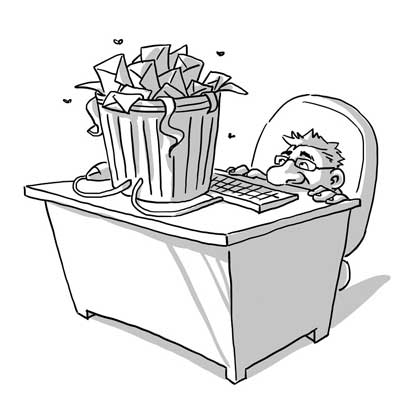Regulatory dam can block endless flood of spam
|
|
|
[By Liu Rui / Global Times] |
Many people still remember the iconic signature line from the movie Network, spoken by an angry TV news anchor, "I'm mad as hell and I am not going to take this anymore."
In my more than two decades as an executive at the ABC Television Network in New York, I never quite felt this way. Well, I now think I have finally had it! I have had my Network moment right here in China.
I, Harvey Dzodin, am mad as hell and I am not going to take it any more.
What's ticking me off? Something political? Beijing traffic? The sinking value of my dollars? No, none of the above.
It's being awoken at three in the morning by a junk SMS trying to sell me a gambling junket to Macau. It's the faxes that I receive each week at all hours of the day and night offering me fake receipts. And it's the numerous calls I get each and everyday, Saturdays, Sundays and public holidays included, asking me if I want to sell or rent my apartment. Then, of course, there are the numerous spam e-mails which promise to change my life.
If China is to become a more harmonious society, the government can take a single giant step for mankind by getting rid of these daily nuisances.
No, hackers and clever marketers will never be completely stopped by harassing us in these annoying ways. The challenge is too great, the money too good. They can, however, be severely constrained.
While it seems sadly outdated now, in the US, at the government's urging, a "do not junk" mail registry was established by the Direct Marketing Association. I can remember before I registered how my little mailbox was stuffed full of junk mail.
After registering, the amount of junk mail dropped to close to nil. Similarly, about eight years ago, the US government established a "do not call" list. The number of annoying callers selling real estate, financial services and a host of other things interrupting my dinner and millions of others dropped precipitously.
I wish that there were similar solutions in China, which certainly has the wherewithal to prevent such annoying and wasteful intrusions.
My humble suggestion is that China consider implementing several tools to reduce or eliminate such annoyances for people.
These include "do not contact" lists, as well as places where complaints can be lodged and quickly investigated. I also suggest for those contacts that are legal, that rules be established as to hours of delivery, frequency and other considerations of privacy.
Obviously, there needs to be the ability to levy substantial fines, and to impose jail terms on the worst offenders.
Actually, there is a precedent within China. Hong Kong has been a leader in addressing these issues so there are tried and true solutions with Chinese characteristics that are currently available for study and implementation by the central government.
Authorities in Hong Kong have established three "do not contact" lists in the last few years. These are directed at unsolicited faxes, short messages and, most recently, recorded messages. In addition to also barring unsolicited telemarketing calls, these three steps would most certainly add a high degree of harmony to our lives.
The toughest nuts to crack are good old-fashioned spam e-mails. While junk mail filters can do a reasonably good job of blocking many of them, spammers must stay awake nights exploiting vulnerabilities and finding workarounds. Too bad that such brain-power can't be put to work to build better societies and legitimate businesses!
Since spam tends to be both international and to involve multiple countries, single state solutions may be largely ineffective. A studyreleased this week by two University of California computer scientists may suggest a partial solution.
The scientists found a "choke point" that could dramatically shrink the amount of spam. It turns out that 95 percent of credit card transactions for spam-advertised drugs and herbal medicines are handled by just three financial companies. Regulate those institutions better and the amount of spam could be dramatically reduced.
 0
0 







